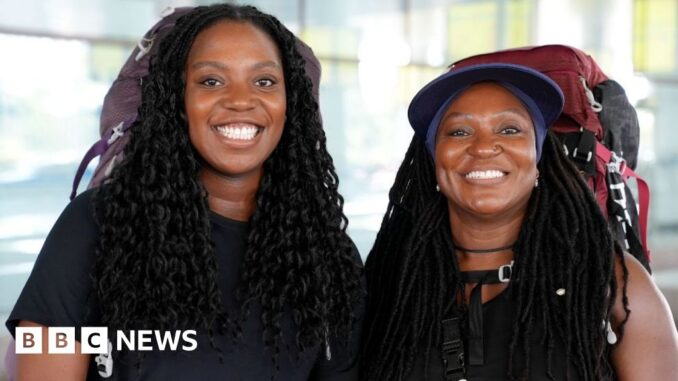
This article does not reveal the winner of Race Across the World, but does include details of some earlier moments from series four.
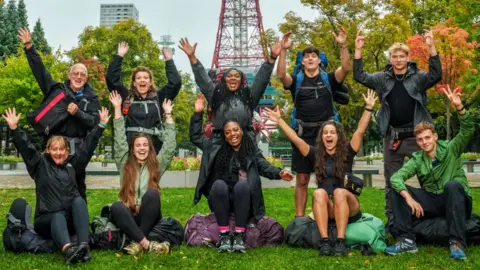 BBC/Studio Lambert/Pete Dadds
BBC/Studio Lambert/Pete DaddsAs the final for Race Across the World approaches, some of the show’s intrepid contestants reveal why they think it is such a success, calling it relatable, inspiring and, not surprisingly, exhausting.
For anyone who hasn’t seen the Bafta-winning BBC One Show, it offers a bird’s eye (or perhaps coach window) view of five duos, racing around the globe for a £20,000 prize.
Minus their smartphones, bank cards or the internet, this year’s pairs must travel 15,000km from Japan to Indonesia, with £1,390 to get them across nine countries.
They can earn much-needed extra cash through local jobs, sightseeing when they can.
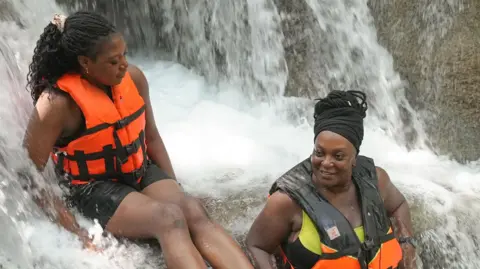 BBC/Studio Lambert
BBC/Studio Lambert Eugenie, 60, who is racing with her daughter Isabel, 25, told the BBC she thinks the show appeals to viewers because they can recognise elements of themselves in the contestants.
“We’ve had many people approach us and say they can relate, with me as a mother and Isabel as a daughter,” Eugenie said.
She added they are so lucky to “have experienced all those different cultures, with all those memories”, something viewers are able to share too.
Throughout the series, viewers have watched Eugenie and Isabel’s powerful personalities clash at times, but also seen their relationship grow and deepen, as they find new ways of understanding each other.
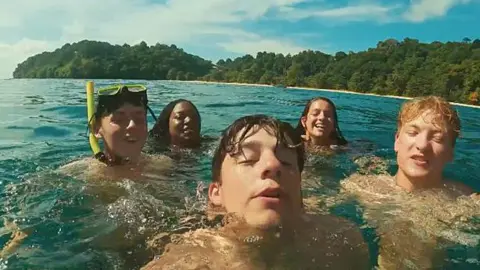 BBC/Studio Lambert
BBC/Studio LambertTV critic Scott Bryan told the BBC one of the show’s superpowers is that “it’s really authentic”, with “each team making their own decisions – we see their mistakes and watch them gain confidence, and it’s cast brilliantly”.
The show is produced by Studio Lambert, which also makes BBC One’s The Traitors, another series which puts members of the public in the spotlight, so has to choose them very carefully.
“As well as seeing the changing landscapes, we also see how they change as people,” Bryan added.
“It’s a big swing from creating big stars in other reality shows such as Love Island – this show celebrates people from many different walks of life and parts of the country.”
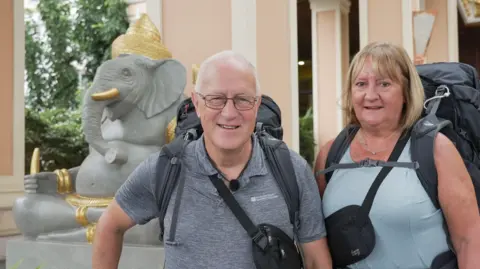 BBC/Studio Lambert
BBC/Studio Lambert Teams often see the best of humanity as they travel.
They meet people who offer them lifts, welcome them into their homes and offer them food, a bed and work, including waxing surf boards and herding ducks.
Stephen and Viv learned how to harvest cinnamon in Sumatra (where Viv also had to improvise, after being caught short in the woods minus a toilet, in a surprisingly candid moment).
This offered viewers insight not only into how the cinnamon in our supermarkets is actually made, but also into the lives of the people gathering it.
“You get to see in people’s homes, which you wouldn’t on a normal holiday,” Viv told the BBC.
“Holiday makers do miss a trick by not staying with the local people.”
She also thinks the series may inspire people to try backpacking, possibly without technology, should they be brave enough.
“It shows travel as being achievable, even without a budget – and without your phone,” she said. “You can still actually get from A to B.”
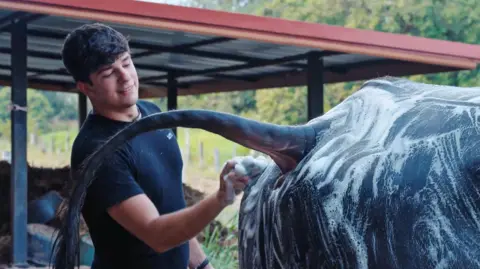 BBC/Studio Lambert
BBC/Studio Lambert Bryan agreed, saying: “The places they visit are glorious and wonderful, and so often off the beaten track. I think they show us places we often wouldn’t see on TV.”
The Guardian’s Rebecca Nicholson called the show “a travelogue, a history lesson, an exploration of psychology, and a thrilling competition”.
She described it as “TV that makes you feel that there is hope”, adding: “I love that it is also humanitarian, when all can seem so very bleak, and suggests there is still hope in the world, if we open our horizons.”
There was a similar sentiment from Carol Midgley of the Times, who said it’s “about humans living on their wits without modern tech and, more importantly, it shows the world is a far friendlier place than you’d think from watching the TV news”.
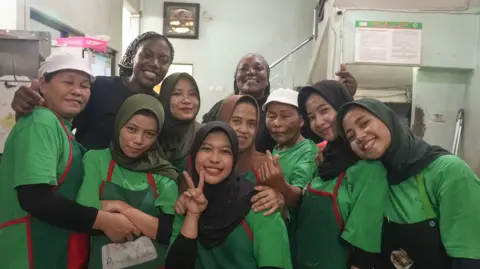 BBC/Studio Lambert
BBC/Studio LambertBryan said the challenges faced by the teams “put them out of their comfort zone, which makes for more interesting TV”.
“Also, it makes you realise it’s far harder than it looks – the internet has made [travelling] so much easier.”
The Independent’s Sean O’Grady reflected that what’s striking about the series “is how much richer the travel experience of all those involved is, because they are deprived of their smartphones”.
“They end up exploring their relationships with their journey partners as much as the picturesque countryside and bustling cities,” he noted.
Viv and Stephen really like the fact that the show reveals how everyone gets on, allowing viewers to get to know the contestants, foibles and all.
“It’s so personal,” Stephen said.
“You get to know the individuals, and honestly without exception, every one of the teams are wonderful – special people, the whole lot of them.”
Viv added: “It’s such a feel-good show.”
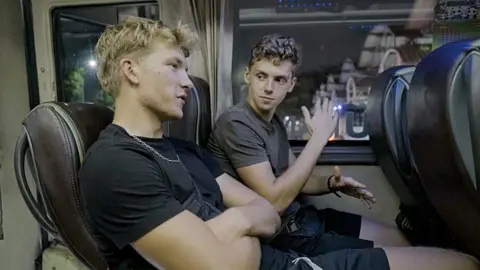 BBC/Studio Lambert
BBC/Studio Lambert The series is as much about its contestants as the race and travelling, and this season has seen some moving moments, prompting equally emotional responses from the audience.
When Alfie and Owen were in Hoi an, Vietnam, Alfie spoke about the death of his Mum when he was aged just five.
He lit a floating lantern for her, pushing it out across the water, and said: “This is the first opportunity I’ve had on the race to think about my mum.
“I’m just inundated with emotions I’ve genuinely not felt since I was a little kid. I just kind of want that sensation of seeing her again.”
His openness prompted one viewer to sum up what perhaps many people were feeling, posting on X: “Right that’s it, we all need to give Alfie a little cuddle right now.”
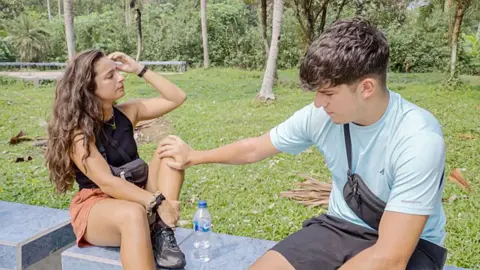 BBC/Studio Lambert
BBC/Studio Lambert Viewers also praised the moment when Betty, 25, shared her diagnosis of Mayer Rokitansky Küster Hauser syndrome (MRKH).
She revealed she was born without a uterus and with just one kidney, and broke down in tears when she spoke about being unable to have children.
MRKH affects 1 in every 5,000 women, according to the NHS, mainly affecting the reproductive system, where women are either born without a vagina and uterus, or the vagina and uterus fails to develop fully.
Betty told the BBC she hoped it could “help someone who might just be getting their diagnosis, to say, ‘that’s ok, I’ve heard of it before, this person has talked about it’.”
Talking about it also helped the siblings become closer, and James became so emotional after their discussion that he asked for a hug from the production team, who are usually strictly off-camera.
Super TV posted on X afterwards: “Oh I’m a mess. Thank you cameraman for hugging him on behalf of five million of us.”
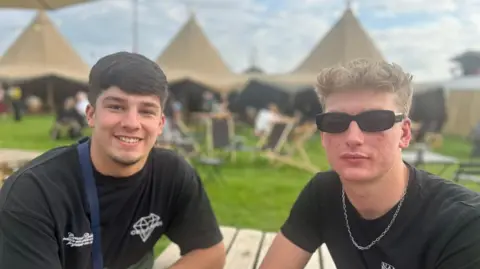
Speaking about the support his sister has had since the episode aired last week, James told the BBC: “You expose yourself to the big wide world and if it can either go badly or it goes well.
“I think the support and motivation we’ve seen in response on social media is absolutely immense… it’s more than we could ever have imagined and expected. So just I must say a massive thank you to everyone who’s supported us.”
Stephen and Viv found that going through such an intense experience, including being filmed throughout by two production crew members, left them exhausted.
Stephen had a heart attack in 2006 and Viv had a stroke in 2011, which motivated them to change their lives, with a positive outlook to live in the moment.
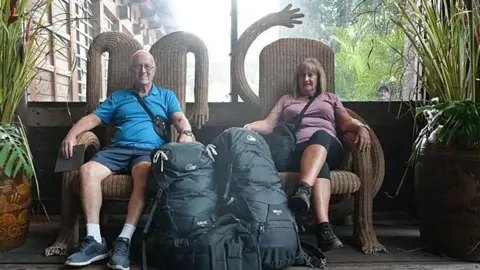 BBC/Studio Lambert
BBC/Studio Lambert Viv previously told Yahoo News their health troubles encouraged them to seize all the opportunities that come their way.
Stephen laughed as he told the BBC: “We had to recover after the show for six months.
“We pretty much slept throughout the whole month of December!”
This hasn’t deterred them though, and nor has it put them off those long coach rides.
“We’re going to Canada next,” he said.
“And we’re actually just talking about taking bus trips around Europe.”
Additional reporting by Mark Savage.
Race Across the World concludes on BBC One on Wednesday 29 May at 21:00 BST.



Be the first to comment